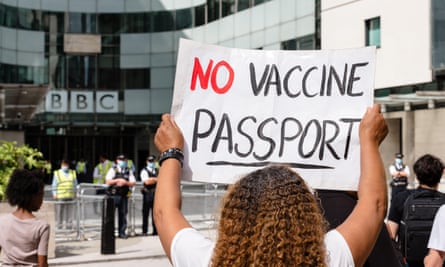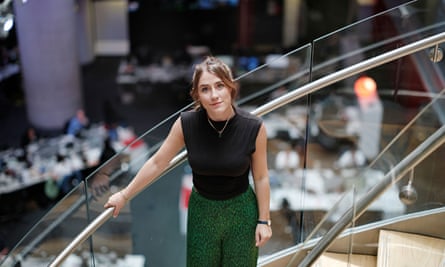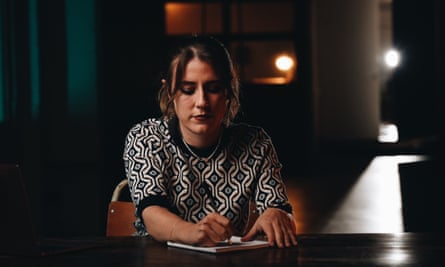On my way into Broadcasting House, the BBC’s London HQ, I saw some graffiti on the building – “BBC Covid Liars”. I had just finished Marianna Spring’s most recent podcast, Marianna in Conspiracyland, and there was something neat and droll about seeing its proposition in real life: Covid hoaxers are real and they are alive with their own righteousness. Not only that, but the BBC is at the centre of their theorising – the supposed public service broadcaster brainwashing the people of the UK.
What I didn’t know until I met Spring, 27, the BBC’s first specialist disinformation and social media correspondent, was that when the graffiti appeared a week ago, posters of Spring’s face went up with it. “I don’t like the way that the huge volume of online abuse spills over into offline action,” she says, trenchant but understated. She doesn’t want this normalised, for people to think: “it’s OK to go outside the BBC and leave a message saying, ‘We’re outside.’”
Conspiracyland is Spring’s latest plunge into the world of Covid hoaxers and anti-vaxxers, the cranks who would once have seemed harmless (and probably have had more harmless theories, such as homeopathy is good for athlete’s foot) but are now possessed by a fiery righteousness that has completely burned through their neighbourliness. As a piece of investigative reporting, Conspiracyland is vivid and thorough. As a social snapshot, it is unsettling, full of people who seem community-centred but harbour violent fantasies about seeing their adversaries hang; people who seem soft and lefty but are enmeshed in the tropes of the far right. It is so fair-minded that at times it feels like it is taking a set of scales to a gun fight, but we will talk about that later.

Spring is an extremely energetic, personable young woman. In a screwball comedy about a newsroom, she would be the one described as a dynamo. She is screen-ready – her earrings match her necklace, which matches her trousers, which match her shoes – but seems completely without vanity, the way athletes do. All that emanates from her is drive, curiosity and focus, and the zeal of authentic public-spiritedness. In your crankiest, most contrarian mood, you would still find it impossible to dislike her; it would be like trying to dislike the Lionesses.
Yet of all the online abuse directed at the BBC and its staff, 80 per cent is aimed at her; and these are what they call “escalations”, messages deemed serious enough – whether because they contain physical threats, violent language, negative sentiment or doxing – that they have been flagged for further assessment. She can’t pick up her phone without seeing a fresh stream of abuse. “The thing that I find difficult is how personal a lot of that hate becomes. It’s often very misogynistic. It’s very much about me, it’s not about my journalism. It’s someone saying, ‘You are a whore’, ‘you are a slag’, ‘I hope you get run over’. And that is not legitimate opposition or criticism.”
In 2021, a year before Conspiracyland, Spring made Disaster Trolls, a podcast about conspiracy theorists who hound the relatives of victims and survivors of major tragedies in a mission to prove that the disaster didn’t happen. She recalls: “One of the Manchester Arena survivors who was really badly targeted said to me, ‘It’s like bullying.’ These trolls keep going and going until you realise that the only point at which they will be happy is when you say, ‘I’ve had enough, I’m not doing this any more.’”

Unlocking this riddle – of why Spring would become the ultimate target of conspiracist hatred – would be incredibly revealing of what powers and underpins it. It is salient that she is young and female, and this speaks to the intersections between conspiracy movements and the “manosphere”: violently misogynist online communities that revolve around the philosophy that reality is a hoax and only they have seen the truth (although the conspiracy, in their case, is not the Covid vaccine but feminism). It also seems relevant that she is such a reasonable voice. Her language is sober and restrained, her manner is nonconfrontational, she won’t opine without evidence: she almost seems to embody the liberal consensus in human form. If they could bully her into submission or somehow discredit her, that would be a hell of a scalp.
Their persistence, though, only makes her more stubborn. “The more they do that to me, the more determined I am to keep on doing what I do. Because the more violent and extreme the rhetoric becomes, the more important it is that I expose it.”
Spring grew up in Sutton in south London, her father a doctor, her mother a nurse until she retrained a decade ago as a family therapist. Her father’s profession crops up in some of the conspiracist trolling, that she is part of the medical establishment that is deliberately plotting to kill people with the Covid vaccine. Which is ironic, she says, laughing, because “I think my dad is the most disobedient person I have ever met. I cannot imagine him ever, ever putting what he is told by the authorities over patient safety.” Her mother, meanwhile, instilled her quite distinctive interviewing style, which is accepting, unthreatening, therapeutic: “You can get into a back and forth with people about what is true and what isn’t, but actually asking, ‘When did this start for you?’, ‘Why were you drawn towards this stuff?’, gives you more insight. When my mum listens to my podcast, she’s like, ‘Oh! Did you learn that from me?’”
She studied French and Russian at Oxford, which meant spending 10 months in Yaroslavl. “They say it’s just outside Moscow, but it’s about four hours from Moscow. It was amazing, but it was pretty hardcore.” She wrote for the Moscow Times when she was there, and her language skills and experience of the country furnished her first break in UK journalism, a cracking piece (in the Guardian, actually) about how domestic abusers in Russia were punished with fines that their victims then had to pay. She also did work experience on Private Eye and came to the BBC via shifts on Newsnight, which the then-presenter Emily Maitlis offered after Spring sent her some articles.
She came to specialise in the investigative field and disinformation through the first news event she can remember: 9/11 happened when she was at primary school, in year one. “I remember being collected by my mum; she said some people had flown planes into these buildings. I could not get my head around the idea that this was not an accident. Six-year-old me could not understand how a plane gets flown into a building on purpose.”

Still at primary school when the 7 July bombings happened in 2005, Spring was by then obsessed with the news. As a society, we talk so much about how new media has changed the consumption of news and almost never about how different and how much faster news has become over the past two decades; not because of technology, but because it is worse. Just before 2000, we lost months talking about the Millennium Dome, as if it was the most parlous mistake the country had ever made. Try to imagine going even a week today with nothing happening that was worse than the Millennium Dome.
If conspiracy theories have always existed, their nature over this period has also fundamentally changed, in ways Spring spells out. “Conspiracy theories around 9/11, and even around the JFK assassination and the moon landings, used to feel a lot more hobbyist. They were less acute. They weren’t happening in real time. So the pandemic, the war in Ukraine, climate change, it is happening right now. These conspiracy movements aren’t reflecting back on past events. They want to find someone right now to blame, to be angry at, to hate.”
When she made a Panorama programme, also in 2021, that was her explicit question: “Why do you hate me?” It was directed at the online trolls who were already, pre-Conspiracyland, making her digital life hell. “[Twitter] would say that they were continuing to protect the voices of their users, but I wouldn’t say that my voice was being protected,” she says.
In March this year, Spring made another Panorama about Twitter post-Elon Musk, to which Musk tweeted in response, “Sorry for turning Twitter from nurturing paradise into place that has … trolls,” adding that he was rolling on the floor laughing his ass off. She remembers: “I had a whole wave of abuse after Elon Musk shared a tweet about me, and I thought, ‘Yes, this confirms what I exposed in my investigation.’” The same goes for the very personalised attacks since Conspiracyland, she says. “This confirms how these tactics work. That really helps me, because I can intellectualise it.”
Well, yes, up to a point. “I don’t want to sound like your mum”, I start, before swerving to, “I don’t want to sound too Guardian”, but I’m a bit uncomfortable with the BBC in all this, allowing one woman to become the face of everything extremists hate about the institution and all it stands for. The BBC is brilliant and she is very well protected, she says.
Until she has a 24-hour minion, cleansing her phone of hate speech before she has to pick it up, I’m not sure I will agree with that. Does she at least have a lot of flatmates, or an enormous partner? This sets off a wild and charming detour about the only personal details she will put in the public domain – she is a Spurs fan and has an 18-year-old cat, concluding, in explanation, “I really don’t want my friends and family to get targeted.” But I wasn’t really asking as a journalist, more as a concerned neighbour, not wanting her to walk home on her own. The real-life risk to all this does not seem negligible. She acknowledges that, carefully. “The way that it spills into the real world, that’s the stuff I really don’t like. This isn’t just for me, this is everyone who is caught up in this and targeted by it. My worry is that when people truly believe this stuff, when the hate becomes so normalised, they go and do something extreme. I hope that by exposing it, I ensure it doesn’t happen. If we’re not talking about it, that’s when stuff happens.”
Once you are talking about real-life violence, you have to admit that the thing Spring and – at the risk of sounding like a conspiracy theorist myself – the mainstream media finds really hard to say is that this is not apolitical crankery: these are the narratives of the far right. The lone wolf fallacy – deployed for terrorists from Timothy McVeigh to Alek Minassian, the incel who killed 11 people in Toronto in 2018 – masks the fact that post-government libertarianism is an ideology; misogyny is an ideology. All these worldviews that start with the idea that, as Spring puts it, “your vote doesn’t count for anything, don’t trust democracy, the government is lying”, end with totalitarianism and necropolitics, the politics of who gets to live and who has to die. Just because the far left also thinks the government is lying doesn’t mean conspiracyland is a post-political territory. It is necessary to the far right in a way that it isn’t to the far left.
In her fair-mindedness, Spring doesn’t chase after political intentionality as she unpicks what draws people to conspiracy theories. But she does recognise that “blame and targeting individuals is very much tied up with far right rhetoric. These people often don’t recognise what they’ve become involved with. If you go on Telegram and look at conspiracy theory channels, they are constantly full of people who start with Covid as a hoax and climate change denial, then draw them into anti-immigrant sentiment. That is a fact. But they see themselves as totally non-political.”
Yes, I know she is pure BBC, but does it never concern her that those connections, between climate change denial and anti-migrant rhetoric, are happening in front of our eyes, not on Telegram back channels, but in the cabinet of the UK government? “There are all kinds of people who will factcheck politicians,” she says, referring not least to her colleagues in the BBC’s various bespoke factchecking roles. “My world and my job is to deal with the extreme stuff causing real world harm.” But isn’t there a call-and-response thing going on, where climate change refuseniks have their rage and denial mirrored back to them by the prime minister? Here, Spring loses patience, though so nicely that I only recognise it later. “I constantly get, ‘Marianna, why have you not BBC-verified this?’ Every single thing. It’s like I’ve become the complaints person. I think they think I’m Superwoman. I can’t do everything. We all have to think about how ecosystems work – I deal with the extreme stuff.”
